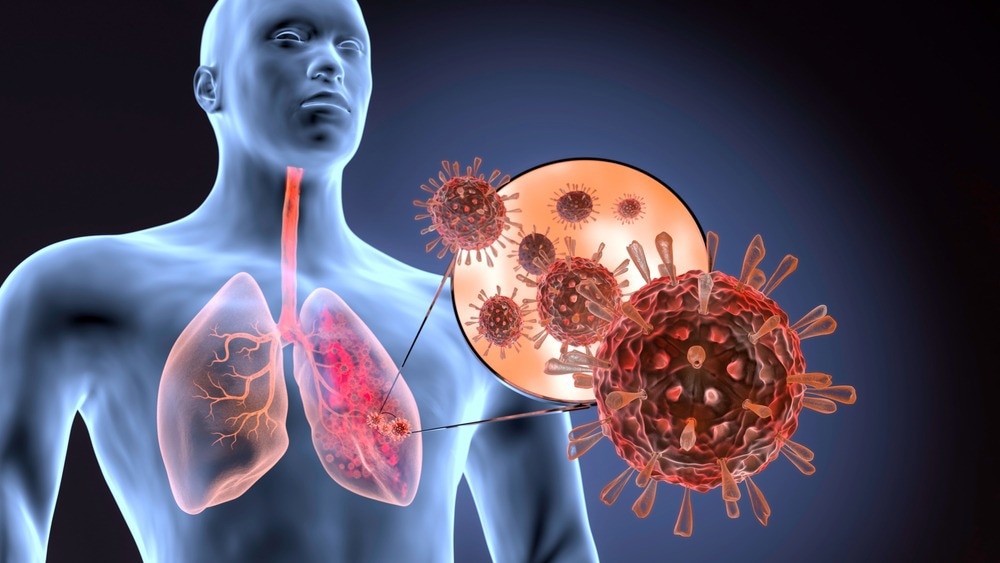In a recent study published in Personalized Medicine, researchers examined the histopathological condition of the lungs of patients who died from coronavirus disease 2019 (COVID-19) caused by the severe acute respiratory syndrome coronavirus 2 (SARS-CoV-2) Delta (B.1.617.2) variant.
 Study: Histopathological Lung Findings in COVID-19 B.1.617.2 SARS-CoV-2 Delta Variant. Image Credit: MarcinWojc/Shutterstock
Study: Histopathological Lung Findings in COVID-19 B.1.617.2 SARS-CoV-2 Delta Variant. Image Credit: MarcinWojc/Shutterstock
Background
The Delta variant (B.1.617.2), first identified in India, was designated a variant of concern (VOC) by the World Health Organization (WHO) in May 2021. Due to its 1.4 to 1.64 times higher transmissibility than the Alpha VOC, it outpaced the rest of the variants by the spring of 2021. In addition, several studies showed that Delta was more aggressive than all the previous strains.
Irrespective of the causal SARS-CoV-2 VOC, data suggests that COVID-19 pneumonia alters lung perfusion, edema, atelectasis, and, therefore, recruitability. Also, SARS-CoV-2-infected patients tend to have heavy, firm, and edematous lungs. Diffuse alveolar damage (DAD) is the most commonly reported condition in COVID-19 patients, which changes lung histology.
About the study
In the present study, researchers analyzed six male and four female patients aged between 40 and 83 years who died from SARS-CoV-2 infection by the Delta VOC in Romania between December 2021 and February 2022.
They performed an autopsy on four of 10 patients and a postmortem lung biopsy for six patients. They retrieved two necrotic lung fragments 12 hours after the patient's death. They used one sample for SARS-CoV-2 virology analyses and the other for histopathology.
Results
Genetic sequencing during virology analysis identified B.1.617.2 in lung samples from eight patients and unique mutations of the Delta VOC in two patients. Macroscopic examination revealed acute pulmonary edema in seven of 10 deceased patients. The most frequently observed lesions in the histopathological examination were acute pulmonary edema (70% cases), followed by DAD. However, in all ten autopsied cases, the lungs had increased in weight, their consistency had become firmer, with higher consistency on palpation, and they appeared reddish–brown (or purple) from lung hepatization.
Case No. 4 presented a plexiform lesion, a trademark of severe pulmonary hypertension. One of the lung sections also revealed bronchopneumonia and purulent and hemorrhagic secretions. Due to a lack of antemortem clinical data, the researchers could not correlate the plexiform lesion directly with COVID-19. The immunohistochemical examination revealed that six of 10 patients were positive for SARS-CoV-2 proteins.
Importantly, five cases were positive for SARS-CoV-2 proteins in alveolocytes, of which one was in an endothelial cell. This particular finding suggested that SARS-CoV-2 also caused indirect damage from thrombosis. COVID-19 DAD had similar histopathological stages as DAD due to other causes and similar morphology. It entered from the exudative stage to the organizing stage, and finally, the fibrotic stage.
Conclusions
The Delta variant is one of the most aggressive strains of SARS-CoV-2. Yet, the study results did not reveal any unique pulmonary histopathological aspects for Delta compared to its predecessors. However, SARS-CoV-2 spike protein-binding antibodies on alveolocytes and endothelial cells showed the potential for indirect damage from thrombosis.